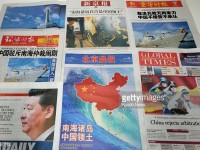Zheng Yu, Professor, Chinese Academy of Social Sciences
Jul 29, 2016
Neither Beijing nor Moscow have the intention to form a military alliance, which would conflict with a key component of the concept of “a harmonious world” central to the Shanghai Cooperation Organization. China and Russia face different circumstances, and choosing a strategic partnership of coordination instead of alliance leaves necessary room for both to deal with their individual national interests.
Stephen Roach, Senior Fellow, Yale University
Jul 29, 2016
The lesson of Donald Trump and Brexit is that while elegant in theory, globalization suffers in practice. Those who worship at the altar of free trade – including me – must come to grips with this glaring disconnect.

Wu Shicun, President, China Institute of South China Sea Studies
Jul 27, 2016
No country is willing to accept an international judicial judgment or arbitration award against its unwillingness, especially when such judgment is related to a major political issue that concerns the state. Thus, China is correct in its decision of non-acceptance in allowing a third party mechanism to determine a territorial dispute and maritime delimitation.
Jared McKinney, PhD student, S. Rajaratnam School of International Studies
Jul 27, 2016
A new Penguin Special book attempts to recast China’s rise using eight “imperfect analogies.” Jared McKinney reviews the effort and reflects on the use of analogies in American political discourse, arguing that China’s rise broadly conceived still shares the most similarities with that of another contemporary great power: America.
Jul 26, 2016
Security Advisor Susan E. Rice met with senior Chinese officials in Beijing, China on July 25 to prepare for President Obama’s visit to China in early September and to discuss bilateral, regional, and global issues of mutual interest. This was Ambassador Rice’s fourth visit to China as National Security Advisor.
Alek Chance, Research Fellow, Institute for China-America Studies
Jul 26, 2016
There is an apparent risk that the US and China will each believe that they promote a win-win international order while suspecting the other of “power politics.” However, the real issue is not a simple choice between mutually beneficial interactions and realpolitik. What is really at stake is the question of which rules will govern a post-realpolitik order, and what kinds of power structures are necessary to support it. Here the US and China have much work to do in order to find converging paths.
Su Xiaohui, Deputy Director of Int'l & Strategic Studies, CIIS
Jul 25, 2016
ASEAN and countries that make claims against China similar to the Philippines must pay more attention to the stability of the South China Sea, work closely with China, and avoid being fraudulently manipulated by third parties with their own political agendas.
Yu Sui, Professor, China Center for Contemporary World Studies
Jul 25, 2016
China’s advocacy of win-win cooperation marks the extension of its development philosophy to the rest of the world. Returning good for good and making concerted efforts to overcome difficulties are the spiritual mainstays of win-win cooperation and the soul of the new type of international relationship.
Feng Zhongping, Director, Institute of European Studies, Chinese Academy of Social Sciences (CASS)
Jul 21, 2016
China wishes both the EU and the UK prosperity and success in the future. With Brexit having little relevance in China-EU relations, it should not become a distraction in developing and improving ties.
John D. Ciorciari, Associate Professor, University of Michigan
Jul 20, 2016
Last week, the Permanent Court of Arbitration (PCA) issued a sweeping repudiation of China’s maritime claims in the South China Sea. The ruling’s significance will soon be tested at the July ASEAN foreign ministers’ meeting. The positive potential of the decision lies in its capacity to align the incentives of the various claimants and facilitate more genuine multilateral talks on a thoroughly multilateral feud.
Back to Top

- China-US Focus builds trust and understanding between the U.S. and China through open dialogue among thought leaders.
- Our Offerings
- Topics
- Videos
- Podcasts
- Columnists
- Research Reports
- Focus Digest
- Stay Connected
-
Thanks for signing up!
- Get the latest stories from China-US Focus weekly.